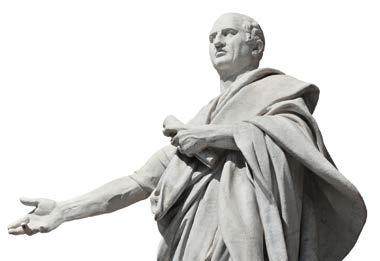
7 minute read
Quotes and Misquotes
Peter Zablud, AM, RFD
Authors and public speakers have long since sought out and relied upon the words and ideas of others to augment and embellish their verbal and written presentations.
For instance, the great Roman orator and lawyer, Marcus Tullius Cicero, was widely renowned for his use of literary allusions and quotations in his speeches and writings.1
©iStockphoto.com/yuriz
In more recent times, until the advent of the Internet, tools of trade for most writers and speakers have included books of quotations such as Bartlett’s Familiar Quotations (now in
See, e.g., ML Clarke, “Ciceronian Oratory,” Greece & Rome [1945] (14), 72 its 18th edition). Today, most people turn to Professor Google to seek out appropriate aphorisms, witticisms, and quotes.
When using someone else’s words, however famous they may be, in the overwhelming majority of cases it is important to give proper attribution. As a rule, correctly sourcing and crediting a quote isn’t too difficult. But, to coin a phrase, it can be a task full of traps and pitfalls for the unwary.
Merely because a saying or a quote is written in a book or found online or has become a familiar part of the lexicon, does not mean it has been accurately quoted or properly attributed and has not been plagiarized.
Indeed, it is remarkable to discover how many commonplace quotes and phrases that are taken for granted are misquotes or have been incorrectly attributed or are bogus or just flights of fancy.
To “gild the lily” is a phrase wrongly attributed to Shakespeare. In The Life and Death of King John, the line from which the “quote” is taken is found in Act 4 Scene 2 of the play, when the Earl of Salisbury remarks, “To gild refined gold, to paint the lily…is wasteful and ridiculous.”

“Discretion is the better part of valour” is another misquote from the Bard’s works. In Act 5 Scene 4 of King Henry IV Part 1, Falstaff actually declares, “The better part of valour is discretion.”
“Pride goes before a fall” is generally thought to be a direct quote from the Bible’s Book of Proverbs. In the King James Bible, Chapter 16 verse 18 of Proverbs reads “Pride goeth before destruction and an haughty spirit before a fall.”
American folklore is a fount of material for presenters. Here as well, care must be taken when choosing quotes to use.
For example, the image of Paul Revere atop his galloping horse warning the community of the approaching Redcoats is indelibly etched into the American psyche. Most books of quotes and Internet sites about quotes make it clear that Revere did not shout the warning, “The British are coming!” Almost invariably, however, they go on to assert that the warning was invented by Henry Wadsworth Longfellow and appears in his poem, Paul Revere’s Ride. Neither the alleged warning nor anything similar to it are found in the poem.
It seems that George Washington’s biographer, Parson Mason Locke Weems, concocted the famous “cherry tree” story about America’s first President. He simply made up this quote, which he attributed to the youthful Washington, “I cannot tell a lie, Pa; you know I cannot tell a lie. I did cut it with my hatchet.”2
Ironically, that bogus quote that is now almost always misquoted as “I cannot tell a lie. It was I who chopped down the cherry tree,” is accepted throughout the United States as being genuine.
Two communications experts from Calvin University, Michigan,
Mount Vernon Ladies Association of the Union, Where the Cherry Tree Grew: An interview with Phillip Levy, [undated]. Found at <www.mountvernon.org> (Prompted by the Wikipedia entry for “Mason Locke Weems”). have observed that over the years, the public at large, including scholars, has become so accustomed to seeing and hearing unvetted and unsourced quotations attributed to famous or historically important figures, that when a quote is said to be by a well-known person, it is automatically accepted as being so.3
The sayings, one-liners, and bon mots of the American humourist (and one-time Nevada Notary) Mark Twain, have created a veritable goldmine of quotes. A recent google search for “Quotes by Mark Twain” unearthed “about 22.9 million results” (in just 0.28 seconds).
Mark Twain did not say or write everything that has been attributed to him. It is certain that he did not come up with the comment, “There are three kinds of lies— lies, damned lies, and statistics” so often credited to him. The late Dr. Peter M. Lee of York University uncovered at least a dozen possible originators of that quote.4
Nor was Mark Twain the author of the delightful remark (also wrongly attributed to Abraham Lincoln), “Better to remain silent and be thought a fool than to speak out and remove all doubt.”
Dorothy Parker, New Yorker writer and queen of the fabled “Algonquin” Round Table, was reputed to be able to make a pun out of any word. When approached by a cynic who asked her to make
3
4 Quentin Schultze and Randal Bytwerk, Plausible Quotations and Reverse Credibility in Online Vernacular Communities, ETC: A Review of General Semantics, Vol. 69 No. 2 (April 2012), 216.
Peter M. Lee, Lies, Damned Lies and Statistics (found at <https://www.york. ac.uk/depts/maths/histat/lies.htm> a pun out of “horticulture,” she immediately responded, “You can lead a whore to culture but you can’t make her think.”
Despite being responsible for a wealth of puns, witticisms, and quips, Mrs. Parker is quoted as saying, “I am not witty and I am not funny. But I do have a reputation as a smarty pants…I hardly say any of those clever things that have been attributed to me. I wouldn’t have time to earn a living if I said all those things.”5
Bogus quotes, wrongful attribution, and errors arising from the ravages of time are not confined to the USA. Similar issues abound in countries across the Atlantic.
Whether or not Queen Victoria ever said, “We are not amused,” is now shrouded in mystery. According to an undated English “Radio Times” report (found online of course), it is possible that the quote may have been misattributed to Queen Victoria and may actually have been something said [4 centuries previously] by Queen Elizabeth I. In a 1976 interview, Victoria’s grand-daughter Princess Alice said that the Queen told her she had never uttered the immortal line attributed to her.
Britain’s wartime Prime Minister Winston Churchill always denied that when he was First Lord of the Admiralty, he had said, “The only traditions of the Royal Navy are rum, sodomy, and the lash.” He did, however, confess to his private secretary that he wished he had said it.6
The caustic remark about Charles de Gaulle, “The hardest cross I have to bear is the Cross of Lorraine” also attributed to Churchill, actually appears to have been a remark made by a British envoy to France, Sir Edward Spears.7
5
6 Found at <quoteinvestigator. com/2019/06/12/say-clever>
See the International Churchill Society website <www.winstonchurchill.org>
Since 2000, ABCsolutions has been a leader in Canada’s Anti-Money Laundering and Counter Terrorist Financing compliance and training sector.

AML support: • Staff training; • Biennial compliance reviews; • Compliance officer training and professionalism; • Designing compliance programs.
www.moneylaundering.ca | info@moneylaundering.ca | 613-283-2862
“Quality is never an accident; it is always the result of intelligent effort,” is a brilliant aphorism, often seen in articles about business and commercial matters. It is usually said to be by the 19th century English art critic and polymath John Ruskin. According to Dr. Christopher Donaldson of the Ruskin Research Centre at Lancaster University, although the idea expressed in the quotation has a “Ruskinian ring” to it, the words are not actually Ruskin’s.8
The medieval jurist and teacher, Bartolus of Sassoferrrato (1313–1357), is considered to be the progenitor of the modern doctrine of Conflict of Laws. As noted by the translator of Bartolus’s classic treatise on the subject
In the course of five hundred years, the simple principles which Bartolus laid down [in his treatise] became strangely warped and distorted. [Various scholars in Europe] drew singular conclusions from his expressed opinions and ascribed those conclusions to Bartolus himself.9
How better to finish this article than with a quote about misquotes— for which no source or context may readily be found. The English actor and author Hesketh Pearson is alleged to have said, “Misquotations are the only quotations that are never misquoted.”
Did Pearson really say that and, if so, when, where, and why? s Professor Peter Zablud, AM, RFD, is an Australian Lawyer and Notary and the Director of Notarial Studies, Victoria University, Melbourne, Australia.
8
9 From an exchange of email correspondence with Dr. Donaldson on 20 October 2020.
Joseph Henry Beale, ed and trans. Bartolus on the Conflict of Laws, Harvard University Press (1914) Introduction, 10, (Quoting Armand Lainé from his book, Introduction au droit international privé, (1892) at 131).










